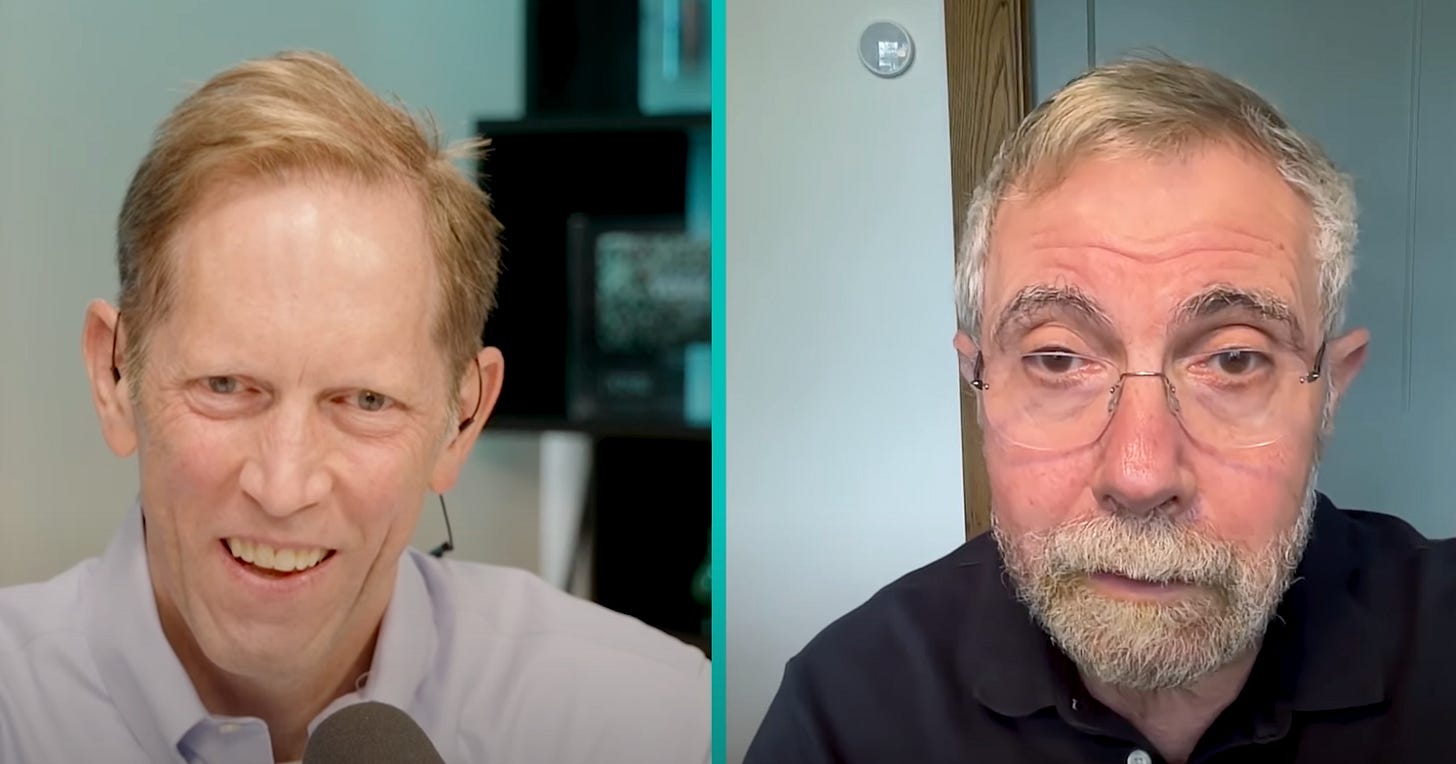Paul Krugman on how to fix our economy
We've got problems. Paul has solutions!
Hello, everyone! Thank you for reading Regenerator.
And thank you for your patience with a long summer hiatus. I’ve been revising a novel (!), which I’ll tell you more about soon. (It’s about a billionaire who has figured out how to live forever and rule the world — and a father and daughter who have to stop him. It’s relevant to some of the topics we talk about here.)
I’ve also been developing a new Regenerator-companion-podcast with the talented folks at Vox Media. The podcast is called “Solutions.” And it’s about…you guessed it... solutions.
The gist of the show is…
Yes, we have a boatload of problems. Fortunately, we also have smart, enterprising, and inspiring people with ideas and solutions. On this show, we talk to them.
Please watch on YouTube: https://lnkd.in/eYq6X-Yw
Or follow wherever you listen: https://lnkd.in/gfaXi-Ny
Our first guest is the Nobel Prize-winning economist, columnist, and super-popular Substacker Paul Krugman. If you don’t already subscribe to Paul’s Substack, you should! Dr. Krugman is so esteemed I feel weird calling him “Paul.” But he says it’s okay, so…
Paul offered hope (and solutions) to many of the economic problems we face, including:
Potentially corrupt economic statistics. Pres Trump recently fired the head of the Bureau of Labor Statistics, presumably because the recent jobs numbers don’t support his preferred narrative. This means that, going forward, even fewer Americans will trust the government’s stats. Fortunately, there are other sources we can use to figure out what’s happening. Also, a new Administration can repair the damage. (This happened in Argentina.)
Tariffs. Like most economists, Paul thinks the tariffs are pointless and destructive and won’t fix the problem they’re supposedly supposed to fix — the offshoring of good manufacturing jobs. But… Paul does not think the tariffs will be as damaging to the economy as other economists suggest. Specifically, Paul thinks the Trump Tariffs will cost us about 0.4% a year of economic growth. Meaningful and unfortunate, but not a catastrophe. Paul also explains why “free trade” helps most Americans and why our tariffs actually were reciprocal (and helpful!) before we started the trade war.
The loss of manufacturing jobs. Most of the “good manufacturing jobs” that we had in the 1970s are gone forever, Paul says. This is not because prior Presidents were weak and stupid. It’s because technology has replaced human labor, the global economy creates value and prosperity for most Americans, and the pro-labor laws, ethos, and unions that made some 1970s manufacturing jobs “good” (e.g., providing middle-class wages and benefits) have been eroded by decades of policies that have mostly benefited the richest Americans. We have full employment in this country, Paul notes. And growing industries. But we no longer encourage (or force) companies to pay middle-class wages, so they don’t.
The causes of — and fixes for — our current extreme inequality, which is as wide today as it was in the “Robber Baron” and “Roaring 20s” eras and contributes to our political division and rage. Yes, globalization and technology play a role, but not as big a one as most people think. The biggest causes have been the rise of pro-capital policies, the decline of unions, and a change in our national business ethos from fairness and community to every-American-for-themselves. If we want to fix that, we should shift the pendulum back! By the way, it’s not the “1%” who are truly killing it in today’s economy — the doctors, lawyers, bankers, and other folks who earn high wages. It’s the 0.01%, who own more of America’s wealth than any time since the 1920s.
The perfect highest-bracket tax rate — one that incentivizes success and productivity and also helps make the economy work for everyone instead of funneling ever more wealth to the 0.01%. Paul says that, per academic research, this rate is... drum roll, please... 73%! Paul also says he’s happy to pay the 52+ cents on the dollar that he, I, and other New Yorkers fortunate enough to earn top-bracket wages are already subject to. (I confess I’m a bit less enthusiastic about it than Paul is.)
Why our current debt and deficit is not debilitating and would not be that hard or painful to fix — if we could create the political will to do it. Unfortunately, right now, neither party has an incentive to address these issues. And, because of that, our fiscal trajectory is worrisome, including to Paul. There are potential savings (and revenue) all over the place. And, no, DOGE wasn’t the answer.
New York City mayoral candidate Zohran Mamdani, who is not a “socialist” in the traditional sense of the word, may be the future of the Democratic party. Paul points out that, in Europe, which is a civilized place with a high quality of life, Mamdani’s policies would merely be considered “left of center,” not “socialist.” Paul also thinks the Democrats need to stand for something, which Mamdani does.
Please watch Solutions on YouTube: https://lnkd.in/eYq6X-Yw
Or follow wherever you listen: https://lnkd.in/gfaXi-Ny
Thank you for reading Regenerator!



